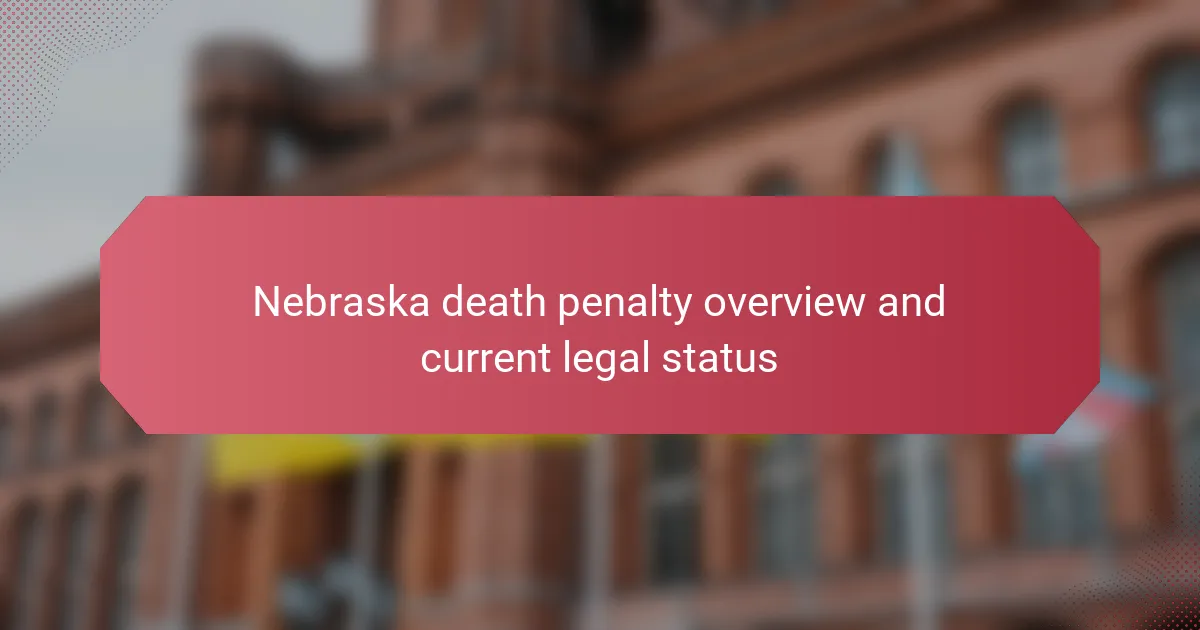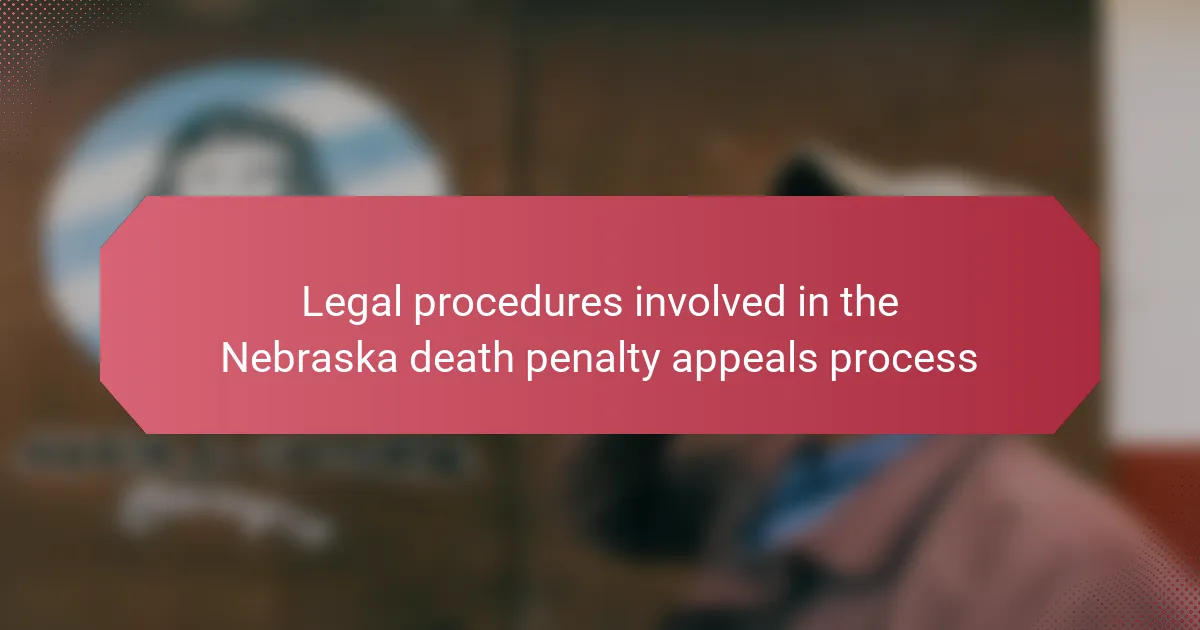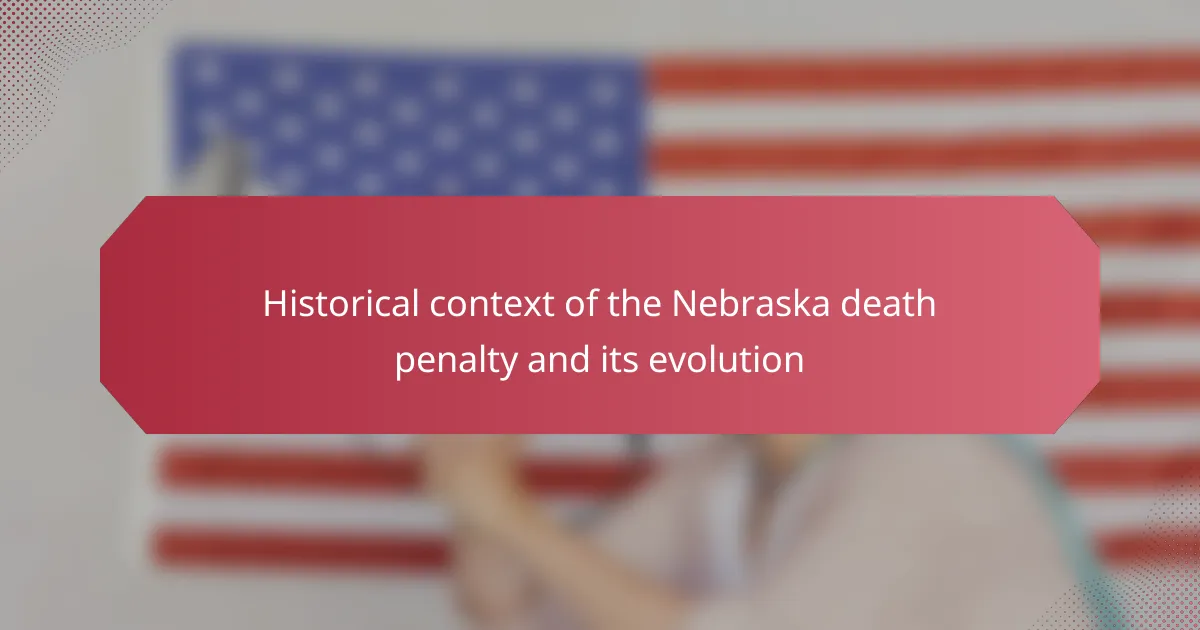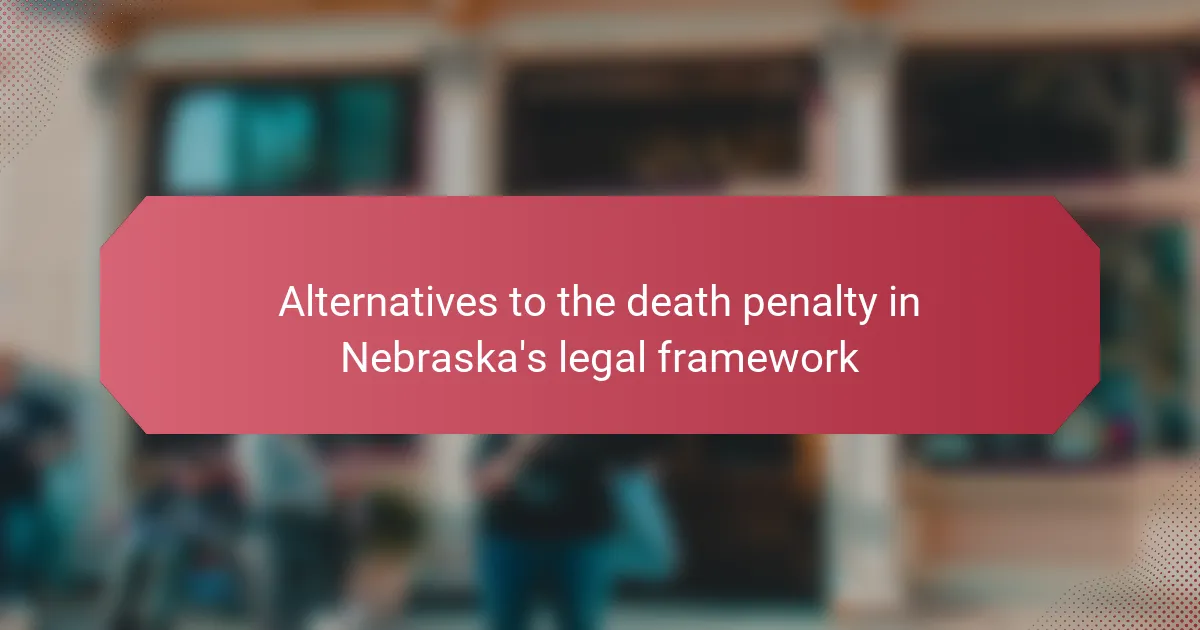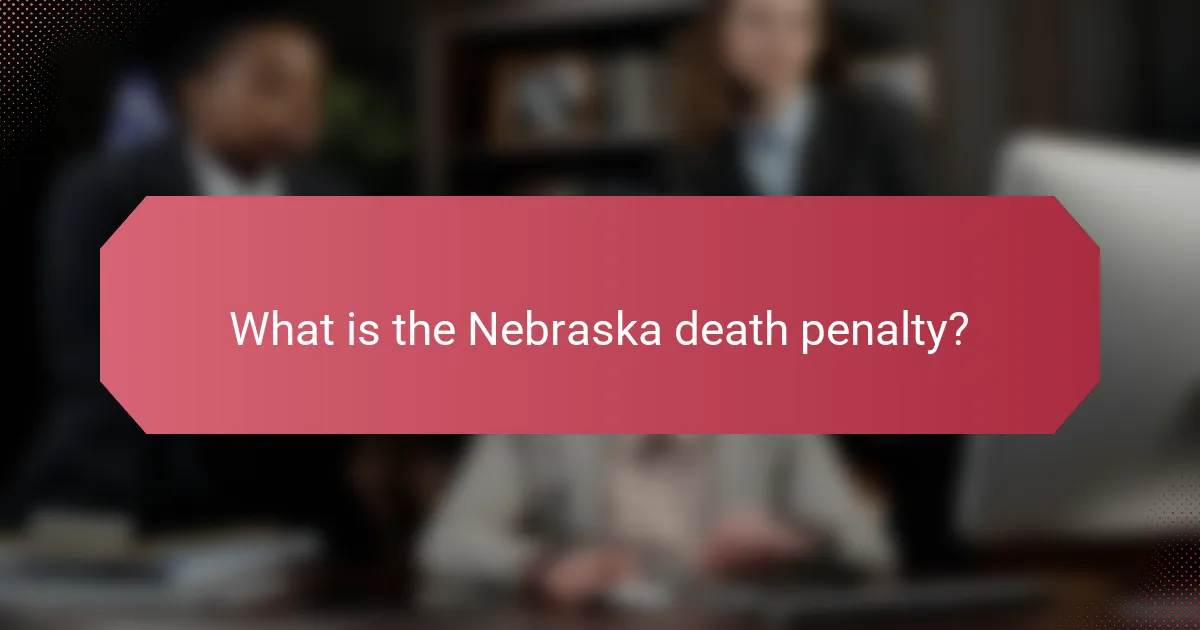
What is the Nebraska death penalty?
The Nebraska death penalty is the legal process by which a person is executed as punishment for a crime. In Nebraska, capital punishment is primarily applied to murder cases. The method of execution is lethal injection. Nebraska reinstated the death penalty in 2016 after a brief period of abolition. The state has executed 3 individuals since the reinstatement. As of 2023, there are currently 10 inmates on death row in Nebraska. The death penalty remains a contentious issue, with ongoing debates regarding its morality and effectiveness.
How has the Nebraska death penalty evolved over time?
The Nebraska death penalty has undergone significant changes since its inception. Initially adopted in 1873, the state used hanging as the method of execution. In 1903, the method changed to the electric chair. The death penalty faced legal challenges in the 1970s, leading to a temporary moratorium. In 1979, the Nebraska Supreme Court reinstated capital punishment with lethal injection as the primary method. Legislative changes occurred in 2015 when lawmakers voted to abolish the death penalty, but this decision was overturned by a voter referendum in 2016, reinstating it. Currently, Nebraska’s death penalty law allows for lethal injection, reflecting ongoing debates about its morality and effectiveness.
What historical events have shaped the current legal status?
The current legal status of the death penalty in Nebraska has been shaped by several historical events. In 1972, the U.S. Supreme Court’s decision in Furman v. Georgia led to a temporary halt of the death penalty across the nation. This ruling deemed existing capital punishment statutes unconstitutional. Nebraska responded by abolishing the death penalty in 1979, replacing it with a life sentence without parole.
However, in 1993, the state reinstated the death penalty, passing legislation to allow lethal injection as the method of execution. In 2008, the Nebraska Supreme Court ruled that the electric chair was unconstitutional, prompting the state to adopt lethal injection exclusively.
In 2015, the Nebraska legislature voted to abolish the death penalty again, overriding a veto by the governor. This decision was significant as it reflected a shift in public opinion and legislative attitudes toward capital punishment. However, in 2016, a petition drive led to a referendum, and voters reinstated the death penalty.
These events illustrate the fluctuating legal landscape surrounding capital punishment in Nebraska, influenced by both judicial rulings and public sentiment.
What significant changes have occurred in legislation?
Nebraska has made significant changes to its death penalty legislation in recent years. In 2015, the Nebraska Legislature voted to abolish the death penalty, overriding a veto from the governor. This change was enacted through Legislative Bill 268. The law replaced capital punishment with a sentence of life imprisonment without parole. However, in 2016, a voter referendum reinstated the death penalty, with 61% of voters supporting its return. This reinstatement was seen as a response to concerns over public safety and justice for victims. The ongoing debate reflects the state’s complex relationship with capital punishment.
What are the key components of the Nebraska death penalty?
The key components of the Nebraska death penalty include the legal framework, methods of execution, and the appeals process. Nebraska’s death penalty is governed by state law, specifically the Nebraska Revised Statutes. The primary method of execution is lethal injection, which was established as the sole method in 2015. The appeals process is lengthy and involves multiple stages, including direct appeal, post-conviction relief, and federal habeas corpus. In 2015, the Nebraska Legislature passed a bill to repeal the death penalty, but it was vetoed by the governor. As of 2023, the death penalty remains in effect, with ongoing discussions about its future in the state.
What methods of execution are currently authorized?
Nebraska currently authorizes lethal injection as the method of execution. The state has adopted this method following the abolition of the electric chair in 2008. Lethal injection involves administering a series of drugs to induce death. Nebraska law specifies the use of a three-drug protocol. This protocol typically includes an anesthetic, a paralytic agent, and a drug to stop the heart. The state has faced challenges in obtaining the necessary drugs for executions. Legal and ethical debates continue regarding the use of lethal injection.
What crimes are punishable by death in Nebraska?
In Nebraska, the crimes punishable by death include first-degree murder. This includes cases where the murder is committed with premeditation and intent to kill. Additionally, the death penalty applies to murders involving aggravating factors. These factors can include the murder of a child, multiple victims, or during the commission of another felony, such as robbery or [censured] assault. Nebraska’s death penalty law is codified in Nebraska Revised Statute 29-2519. The state has a history of using the death penalty, although there have been periods of moratorium.
What is the current legal status of the Nebraska death penalty?
The current legal status of the Nebraska death penalty is that it is active and enforceable. Nebraska reinstated the death penalty in 2016 after a repeal was overturned by a voter initiative. The state has a legal framework that allows for capital punishment under specific circumstances. As of 2023, there are individuals on death row in Nebraska. The state has faced challenges regarding the availability of execution drugs and methods, impacting the implementation of the death penalty. However, the law remains in place, and executions can occur when conditions are met.
What recent court rulings have impacted its enforcement?
Recent court rulings have significantly impacted the enforcement of the Nebraska death penalty. In 2020, the Nebraska Supreme Court upheld the state’s lethal injection protocol. This ruling confirmed the legality of the drugs used for executions. Additionally, a federal court ruling in 2021 blocked the execution of an inmate due to concerns over the death penalty’s application. These decisions reflect ongoing legal challenges surrounding the death penalty in Nebraska. They illustrate the complexities and controversies involved in its enforcement.
How do current public opinions influence its legal status?
Current public opinions significantly influence the legal status of the Nebraska death penalty. Public sentiment can lead to legislative changes or referendums regarding capital punishment. For instance, in 2015, Nebraska’s legislature voted to abolish the death penalty, reflecting a shift in public opinion towards more humane alternatives. This decision was later upheld by a voter referendum in 2016, where 61% of voters supported the repeal of the death penalty. Such instances demonstrate that public opinion can directly impact the legal framework surrounding capital punishment in Nebraska.
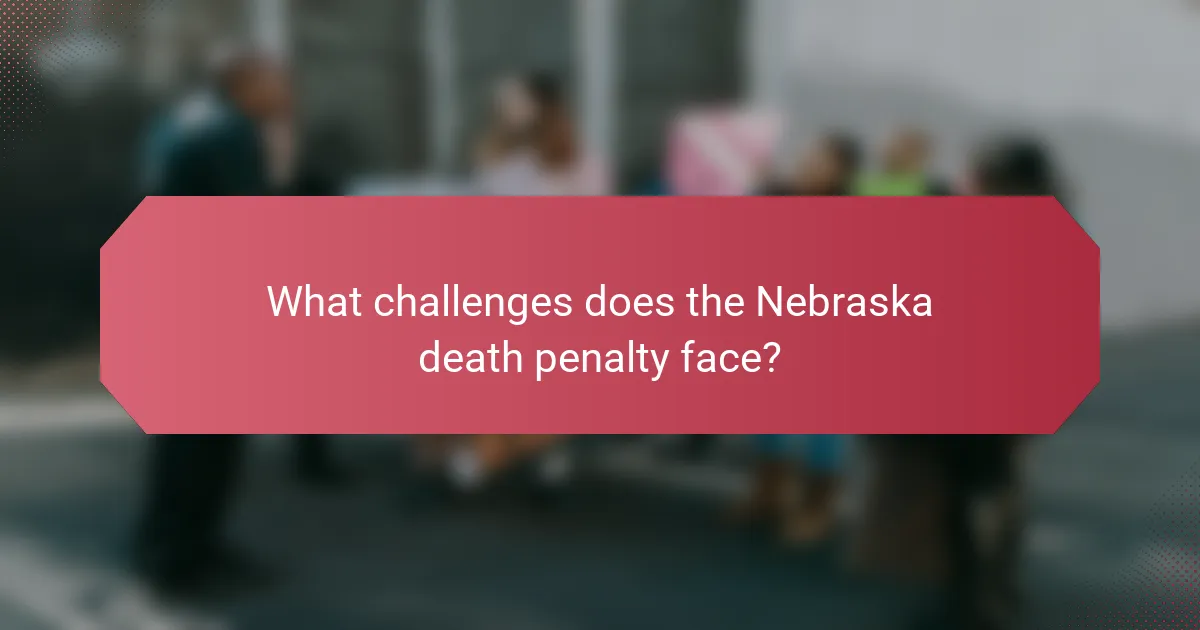
What challenges does the Nebraska death penalty face?
The Nebraska death penalty faces significant legal and ethical challenges. Legal challenges include ongoing debates about its constitutionality. The method of execution has also been scrutinized for its potential to cause pain. Ethical concerns arise from the risk of executing innocent individuals. Public opinion shows a decline in support for capital punishment. Financial costs of the death penalty compared to life imprisonment are substantial. These challenges contribute to ongoing discussions in the Nebraska legislature. The state’s history of moratoriums on executions impacts the current legal landscape.
What are the main arguments for and against the death penalty in Nebraska?
The main arguments for the death penalty in Nebraska include deterrence and retribution. Proponents argue that the death penalty serves as a deterrent to violent crime. They believe that potential offenders may think twice before committing murder if they know the death penalty is a possible consequence. Additionally, supporters view it as a form of retribution. They argue that it provides justice for victims and their families by ensuring that the most heinous crimes are met with the ultimate punishment.
Conversely, the main arguments against the death penalty in Nebraska include wrongful convictions and moral considerations. Opponents highlight the risk of executing innocent individuals. They point to cases where new evidence has exonerated death row inmates, raising concerns about the infallibility of the justice system. Furthermore, many argue that the death penalty is morally wrong. They contend that it is inhumane and that the state should not participate in taking a life, regardless of the crime committed.
How do proponents justify the use of the death penalty?
Proponents justify the use of the death penalty by arguing it serves as a deterrent to serious crimes. They believe that the possibility of execution discourages potential offenders from committing heinous acts. Studies have shown varying results, but some suggest a correlation between capital punishment and reduced crime rates. Additionally, supporters claim it provides justice for victims and their families. They argue that the death penalty offers closure to those affected by violent crimes. Proponents also contend that it prevents the possibility of reoffending by incarcerated individuals. Furthermore, they assert that it reflects societal condemnation of particularly egregious offenses. Historical data indicates that many states with the death penalty report lower murder rates compared to those without it.
What concerns do opponents raise regarding its application?
Opponents of the Nebraska death penalty raise several concerns regarding its application. They argue that it is prone to wrongful convictions. Studies indicate that wrongful convictions can occur due to flawed evidence or inadequate legal representation. Additionally, opponents highlight the high financial costs associated with death penalty cases. Research shows that death penalty trials and appeals are significantly more expensive than life imprisonment. There are also ethical concerns, with opponents claiming that capital punishment is inhumane. They reference the potential for suffering during executions as a significant moral issue. Furthermore, critics argue that the death penalty disproportionately affects marginalized communities. Data indicates that racial bias can influence sentencing outcomes in capital cases. Finally, opponents express concerns about its effectiveness as a deterrent for crime. Research has not consistently demonstrated a clear correlation between the death penalty and reduced crime rates.
What role do advocacy groups play in the Nebraska death penalty debate?
Advocacy groups play a significant role in the Nebraska death penalty debate. They influence public opinion and legislative actions regarding capital punishment. Organizations such as the ACLU of Nebraska and Nebraskans for Alternatives to the Death Penalty actively campaign for reform and abolition. They provide research, legal assistance, and public education on the issues surrounding the death penalty. Advocacy groups often organize rallies and events to raise awareness. They also lobby state legislators to reconsider existing death penalty laws. Their efforts have contributed to shifting perspectives on capital punishment in Nebraska. For instance, in 2015, the Nebraska Legislature voted to abolish the death penalty, reflecting the impact of these advocacy efforts.
Which organizations are most active in this area?
The organizations most active in the area of the Nebraska death penalty include the ACLU of Nebraska and Nebraskans for Alternatives to the Death Penalty. The ACLU of Nebraska advocates for the abolition of the death penalty and promotes civil liberties. Nebraskans for Alternatives to the Death Penalty focuses on educating the public about the issues surrounding capital punishment. Both organizations have actively participated in campaigns and legislative efforts to influence death penalty laws in Nebraska. Their efforts are backed by research and public opinion data indicating a shift towards opposition to capital punishment in the state.
What strategies do they employ to influence policy?
Advocacy groups employ several strategies to influence policy regarding the Nebraska death penalty. They engage in public awareness campaigns to educate citizens about the implications of capital punishment. These campaigns often include social media initiatives, public demonstrations, and informational events. Lobbying legislators is another critical strategy. Groups directly communicate with lawmakers to advocate for policy changes. They also collaborate with legal experts to provide research and data supporting their position. Additionally, they form coalitions with other organizations to amplify their voice. By mobilizing supporters, they create significant pressure on policymakers. These strategies have been effective in shaping public opinion and legislative outcomes in Nebraska.
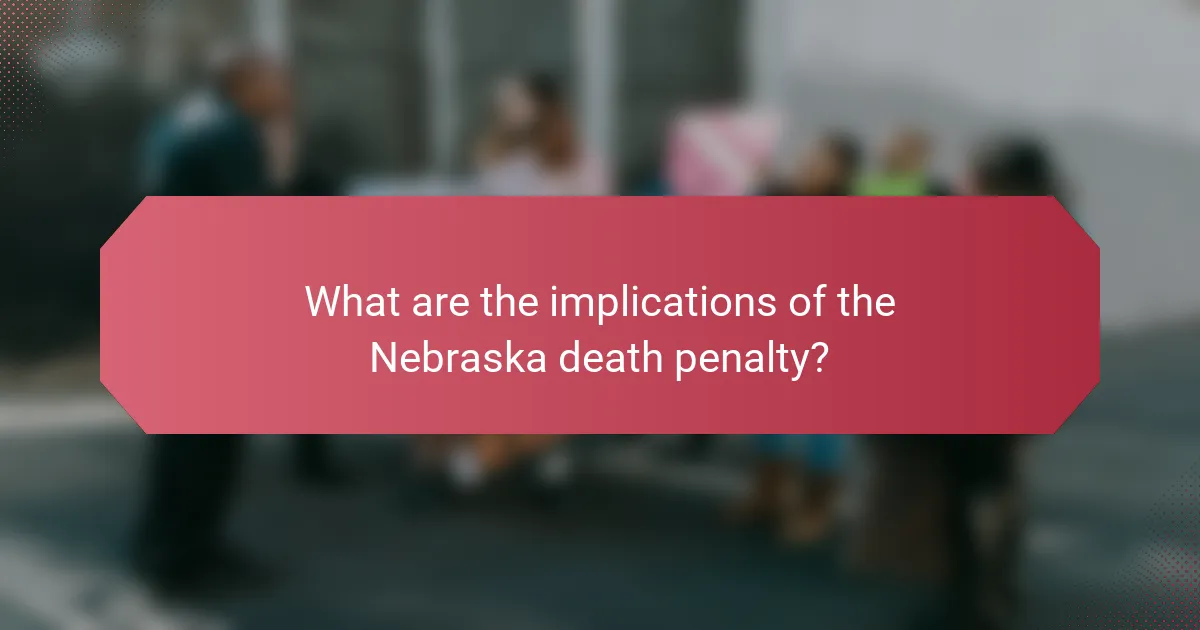
What are the implications of the Nebraska death penalty?
The implications of the Nebraska death penalty include legal, ethical, and financial considerations. Legally, the death penalty in Nebraska is subject to challenges and changes in legislation. Ethical implications involve debates about morality and human rights. Financially, the cost of death penalty cases is significantly higher than life imprisonment. A 2015 report indicated that death penalty cases can cost up to 10 times more than non-death penalty cases. Additionally, the risk of wrongful convictions raises concerns about justice and fairness. These implications shape public opinion and influence policy decisions regarding capital punishment in Nebraska.
How does the Nebraska death penalty affect the justice system?
The Nebraska death penalty significantly impacts the justice system by influencing legal proceedings and public perception. Its presence leads to lengthy trials and appeals, often consuming substantial judicial resources. The death penalty can create disparities in sentencing, as it may be applied unevenly based on factors like race and geography. Additionally, it affects the allocation of funding within the justice system, diverting resources from other critical areas. A 2015 study indicated that death penalty cases cost the state significantly more than life imprisonment cases. The emotional weight of capital cases also affects jurors and witnesses, potentially altering their testimonies and decisions. Overall, the Nebraska death penalty shapes the justice system’s dynamics, raising questions about fairness and efficiency.
What impact does it have on legal proceedings and sentencing?
The Nebraska death penalty influences legal proceedings and sentencing by establishing a framework for capital punishment cases. It determines the legal standards for what constitutes a capital offense. This framework affects the prosecution’s approach and the defense’s strategy in death penalty cases. Sentencing outcomes can vary significantly based on the presence or absence of the death penalty. For instance, the possibility of a death sentence can lead to plea bargains that might not occur otherwise. Additionally, the death penalty’s legal status can impact jury selection and deliberation processes. Recent changes in Nebraska law, such as the repeal of the death penalty in 2015, have shifted the focus to life imprisonment sentences instead. This shift alters how cases are argued in court, as the stakes for defendants change. Consequently, the legal landscape surrounding the death penalty directly affects judicial outcomes and the overall approach to serious crimes.
How does it influence the perception of justice in Nebraska?
The death penalty influences the perception of justice in Nebraska by shaping public opinion on accountability. Many residents view it as a necessary measure for the most heinous crimes. The existence of the death penalty may lead to a belief in a stronger justice system. Conversely, opposition to it can foster perceptions of injustice and inequality in sentencing. Polls indicate that Nebraskans are divided on capital punishment, reflecting varied beliefs about its effectiveness. Legal challenges and changes in policy also impact public trust in the system. The state’s recent moratorium on executions has further fueled debates on justice and morality. Overall, the death penalty remains a contentious issue affecting how justice is perceived in Nebraska.
What can individuals do to engage with the Nebraska death penalty issue?
Individuals can engage with the Nebraska death penalty issue by participating in advocacy efforts. They can join local organizations focused on criminal justice reform. Attending public forums or town hall meetings can also raise awareness. Engaging with lawmakers through emails or calls can influence policy changes. Supporting campaigns that promote alternatives to the death penalty is another option. Volunteering for initiatives that educate the public on the death penalty’s impacts can help. Additionally, individuals can share information on social media to broaden the conversation. These actions contribute to a collective effort in addressing the death penalty in Nebraska.
How can citizens participate in advocacy or reform efforts?
Citizens can participate in advocacy or reform efforts by engaging in grassroots campaigns. They can join organizations focused on death penalty reform. Citizens can also attend town hall meetings to voice their opinions. Writing letters to legislators is another effective method. Participating in protests or rallies helps raise awareness. Engaging in social media campaigns can amplify their message. Volunteering for advocacy groups provides support to ongoing efforts. Educating themselves and others about the death penalty fosters informed discussions.
What resources are available for those seeking to learn more?
Resources available for those seeking to learn more about the Nebraska death penalty include academic articles, legal databases, and government reports. The Nebraska Legislative website provides updated information on current laws and legislative changes. Organizations like the Nebraska ACLU offer insights and advocacy information regarding capital punishment. The Nebraska Department of Correctional Services outlines the operational procedures related to the death penalty. Additionally, books and scholarly journals on criminal justice provide in-depth analyses of the death penalty’s implications. Legal research platforms such as Westlaw and LexisNexis contain case law and legal commentary specific to Nebraska. These resources collectively enhance understanding of the death penalty’s legal status and historical context in Nebraska.
The Nebraska death penalty is the legal framework governing capital punishment in the state, primarily applied in murder cases and executed through lethal injection. Since its reinstatement in 2016, the death penalty has been a subject of intense debate regarding its morality, effectiveness, and legal status, with 10 inmates currently on death row. The article explores the historical evolution of the death penalty in Nebraska, significant legislative changes, key components of the legal process, and the ongoing challenges it faces, including public opinion and ethical concerns. Additionally, it examines the role of advocacy groups in shaping the discourse around capital punishment and the implications for the justice system.
